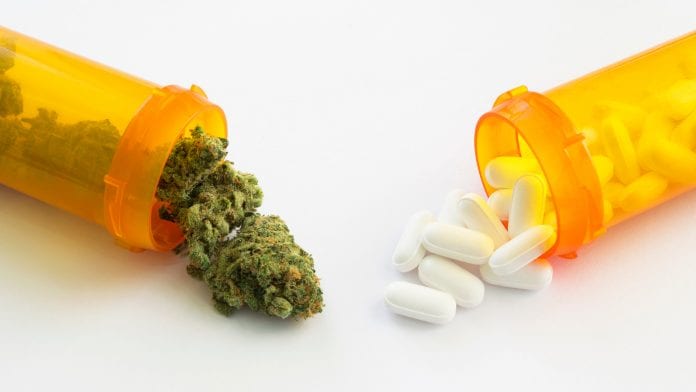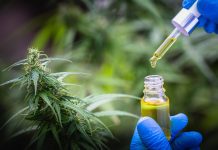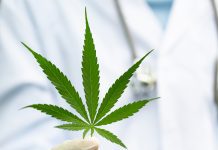
The past few years have seen a rise in the use of opioids as pain killers, but these medicines are highly addictive. Medical cannabis expert and neurologist, Professor Mike Barnes, discusses whether cannabis can provide a positive alternative.
A study from Manchester University demonstrated that prescriptions for the addictive opioid codeine jumped by a factor of five between 2006 and 2017, and that one in seven of all new opioid users became long-term users within the first year.
Medical cannabis expert and neurologist, Professor Mike Barnes of Maple Tree Consultancy, spoke to Medical Cannabis Network editor Stephanie Price to highlight how the UK could benefit from the use of cannabis as a painkiller rather than the addictive opioid pain killers widely prescribed by clinicians today.
The dangers of opioids
Concerns have been raised in recent years that the UK could be following the path of the United States and Canada – which have been battling with an opioid addiction crisis since 2013. However, since the legalisation of medical cannabis in Canada and the United States, the plant is becoming more commonly used as an alternative to opioids due to its pain killing properties.
“Opioid prescriptions are a big issue – there were 75,000 overdose deaths in the United States last year. Of course, there is a bigger population in the United States and its slightly less of a problem in this country, but nevertheless, there are many thousands of people in this country who die every year from opioid overdoses,” said Barnes.
“The problem with them is that you only have to take a little bit more than the prescribed dose then it effects your breathing, and if it’s an older person, who might already have some compromise to their health, like an airway disease for example – it doesn’t take that much to die from opioid overdosage. So, it is a big issue – and the other thing, more importantly, they are not very good for managing chronic pain.
“They are very good for acute pain after an operation or injury for example. They are probably the best thing for severe, acute pain, but for chronic pain they are not very good and that is well recognised. So, the fact they are not very effective and that you can die from them, I agree with NICE that we should discourage their use for chronic pain.”
A 2019 report from the Advisory Council on the Misuse of Drugs (ACMD), ‘Ageing cohort of drug users’, highlighted that the ageing cohort of drug users (aged over 35) in the UK now account for a ‘significant proportion of patients in specialist community drug treatment services’ and that ‘predominant among these are those with problematic opiate/opioid use.’
“There are still young people, of course, who use opioids, so it is still an issue, however, an increasing issue is older people – not necessarily old – but anyone with a chronic pain condition, who are put on opioids, then they become hooked on them. Even if the underlying issue is later gone, the problem is that they then have to get off the opioids. It is an increasing issue with the middle-aged and older populations.”
The benefits of cannabis
The Government has recently increased the level of warning labels on opioid packaging so patients are more aware of the dangers and have encouraged doctors to speak to their patients about these dangers. Barnes highlights that cannabis has a better safety profile than opioid painkillers, and fewer side effects.
“CBD is painkilling and has other beneficial effects, THC is more directly painkilling – and they work very well for chronic pain. So, as a painkiller I think they are much better than opioids. The other good thing about cannabis is that its side effect profile is much better than opioids – I will not say it has no side effects, because it does have some, however, they are very few and are relatively mild – such as drowsiness and a dry mouth.
“The other benefit is that you cannot die of a cannabis overdosage – no one has ever died of a cannabis overdosage, so it is remarkably safer than opioids.
“There is such a thing called ‘cannabis dependency syndrome’. You cannot get addicted to cannabis in the same way you can become addicted to heroin – however, you can become dependent on it like with alcohol and tobacco. About 19% of people who use alcohol become dependent on it – for cannabis dependency it is 9% so it is less than alcohol or tobacco and, of course, that is mainly the ‘street users’ who become dependent. It is very unusual when cannabis is medically prescribed and that is because the CBD ratio is strong in medically prescribed cannabis, whereas the street cannabis is high in THC and low in CBD and is much more prone to cause this cannabis dependency syndrome. So, unlike opioid, proper medically prescribed cannabis you do not get dependent on.
“Figures from the United States show that if you are on opioids, and then you are on cannabis as well the opioids, you can reduce the opioid dosage by 25%, which makes it safer. That is average but will not be the same for everyone. For some people, they are able to come off opioids 100%. Also, you reduce opioid deaths by 25% – that in turn saves money. So, overall – I think using cannabis as an alternative is a very good idea.”
What can the UK do?
Despite the 2018 rescheduling of cannabis for medicinal use, many doctors still do not prescribe cannabis-based medicinal products due to lack of education, unclear guidelines, and the need for approval, points out Barnes.
“We need an education programme for doctors as there is a lot of ignorance as they have never been taught about it. There is also a benefit from better guidelines – the guidelines from the Royal College of Physicians say there is not any evidence to prescribe cannabis for pain, however, it is now licensed as a medicine in 50 countries and 49 of those countries prescribe it for pain. So, they are saying that Canada, the United States, Australia, Germany are all wrong. This flies in the face of evidence as there is a lot of evidence that cannabis has painkilling properties. So, both NICE and the Royal College of Physicians need to recognise that we need better guidance.
“The government has said they have changed the law, however, it could do more, such as helping to improve the supply chain, encouraging doctors to prescribe, and leaning on NICE to perhaps review how it has reviewed cannabis. It could support training programmes, however, the majority of it is the reluctance of the doctors.
“The framework is there to prescribe it tomorrow and one thing the government could do is to take away the obligation of an NHS doctor of having to get approval to prescribe cannabis.”








Cannabinoids have been linked to providing relief of chronic pain due to their chemical makeup. Which is why cannabis’ by-product such as medical cannabis is commonly used for chronic pain relief. There are hundreds of chemical compounds in cannabis, many of which are cannabinoids.
I have friends who take cannabis oil and CBD together who swear by it. They say it doesn’t only relieve them of pain but also relieves anxiety and regulates high blood pressure and prevents headaches. It takes away inflammation in joints too.